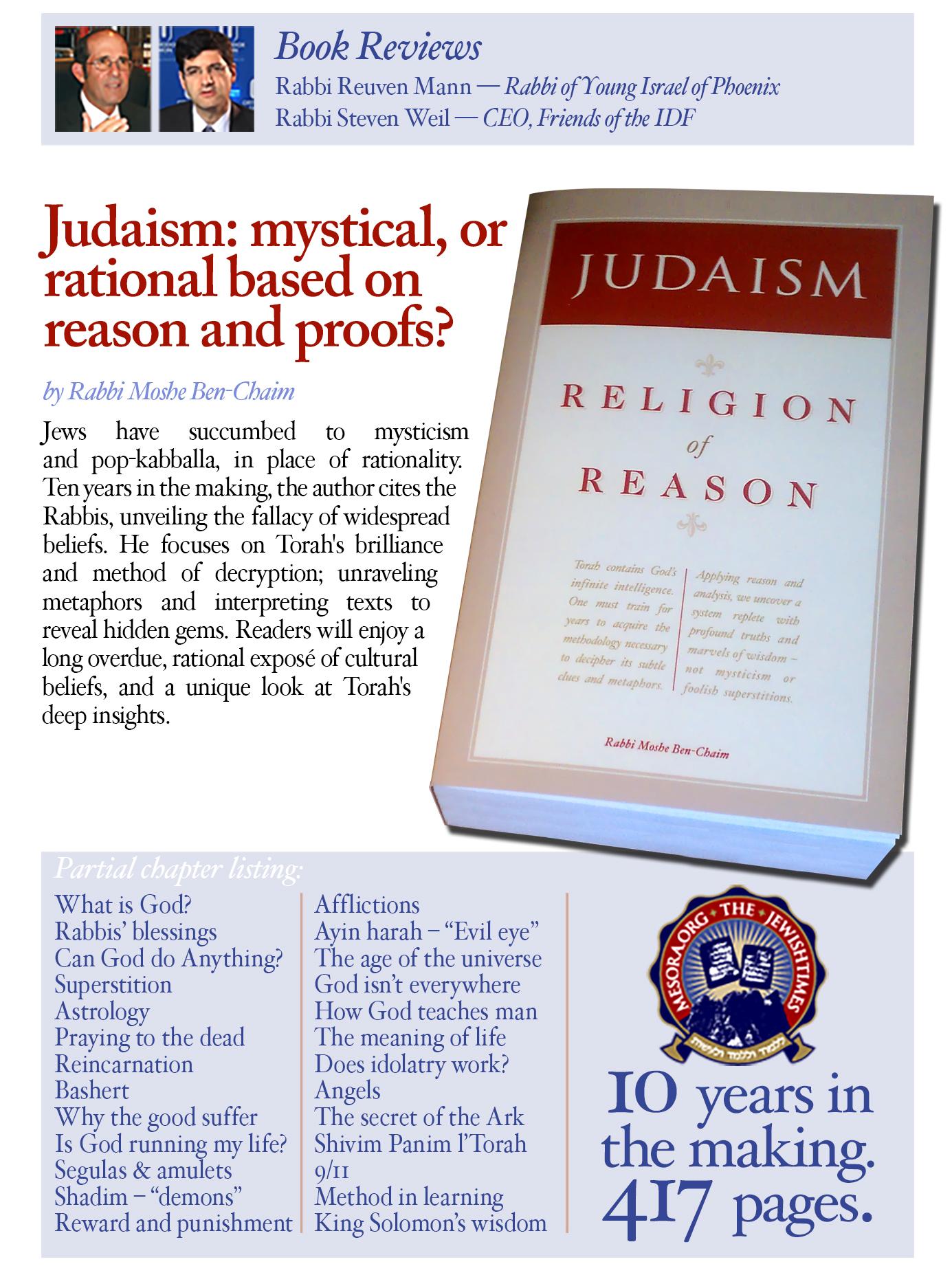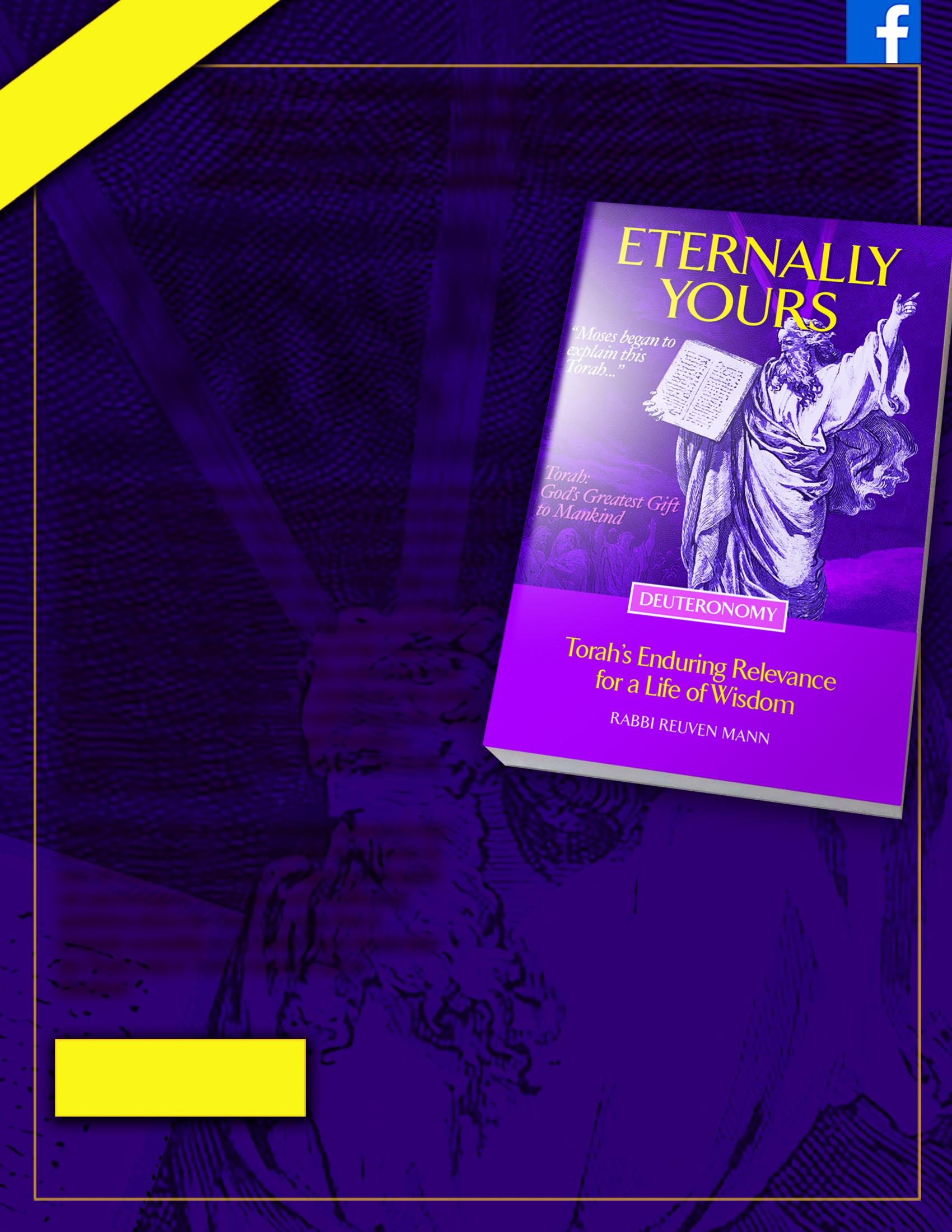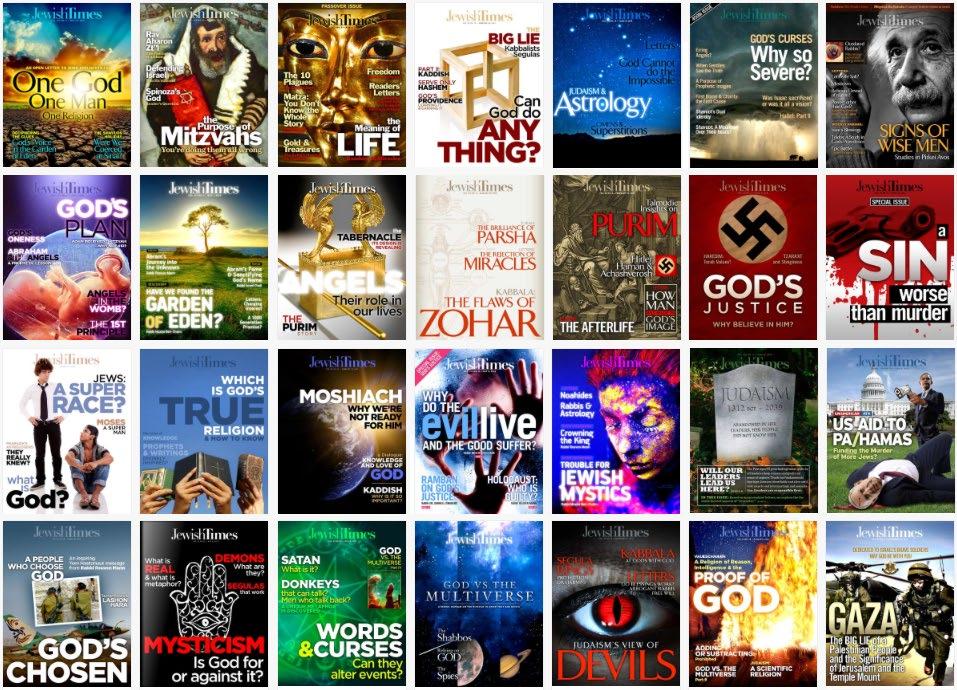







Just click any icon in








3 Holocaust
RABBI ELIE FEDER PHD Torah lessons from a mom’s parting words
RABBI MOSHE BEN-CHAIM
RABBI MOSHE BEN-CHAIM Maimonides reveals man’s psychological errors
What is the purpose, what are the clues?

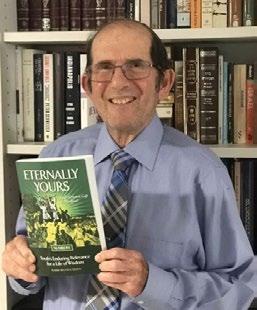
This week we commemorate Yom HaShoah (Holocaust Memorial Day) in which all of Israel pauses from its normal routine to remember the worst Jewish catastrophe in a history of a seemingly endless succession of
RABBI REUVEN MANN tribulations. In fact, our history confirms the haunting words of the Haggada we have just recited, “In every generation they arise to destroy us and the Holy One Blessed Is He saves us from their hands.” Has there ever been a more
prescient prognosis than this one?
A major reason that is given for our need to remember is that we should not be among those who refuse to learn from the mistakes of the past and are therefore “doomed to repeat them.” The implication is that by recounting the Shoah and publicizing it to the world, we somehow gain an immunity from another one in the future. But let us face the question, has our vigilance about the past improved the outlook for Jewish survival in the future?
The answer is very complex. The massacre of October 7, 2023, took the Jewish world by surprise. We were shocked not only by the brazenness of the surprise attack but by the sheer ferocity of its savageness. The merciless brutality against helpless men, women, and children, including little babies in their cribs, drew valid comparisons to the butchery of the Nazis. Indeed, in terms of the primal Jew-hatred that was unleashed, the Hamas assault was in a qualitative sense no less abhorrent than the treatment the Jews received at the hands of Hitler, may his memory be obliterated.


It is therefore clear that remembering the tragedies of the past while extremely significant provides no protection against their being repeated. In my opinion, even those who do learn the lessons of history are often, nevertheless, doomed to repeat them. That is because it is not enough to simply understand bygone mistakes. The person is apt to make the same faulty decisions that he did before unless he recognizes the underlying emotions which caused him to make those mistakes in the first place and strives to master them.
In this context, it is important to note that the misjudgments which enabled the October 7 surprise attack had occurred once before, namely on Yom Kippur, 1973. In that instance also, a certain arrogance and refusal to consider the actual facts as opposed to reliance on the “assessments” of the military and political establishment caused Israel to allow the enemy to deliver the first blow with devastating consequences. In point of fact, Israel had in its employ an Egyptian spy, Nasser’s son-in-law Ashraf Marwan, who provided accurate
information about the imminent attacks from Egypt and Syria. Inexplicably and amazingly, the chiefs of Israeli intelligence refused to accept the information because it contradicted the vaunted “conception” which they treated as if it were a revelation from heaven.
Unfortunately, the mindset which led to the calamity of Yom Kippur, 1973 was still in evidence on October 7, 2023. There was an over reliance on technology, a disdain for the capabilities of the enemy, a refusal to take the warnings about Hamas border activities seriously and an unquestioning belief in the accuracy of the contemporary “conceptzia” (conception) that Hamas was deterred and would not dare combat Israel. It is vitally important but existentially insufficient for Israel to limit its investigation to the practical errors that produced October 7, 2023. Such an endeavor will help greatly, but will be no guarantee that similar mistakes won’t be made again when we are threatened by Arab aggression.
And the same holds true for the Holocaust. Despite the multitude of research and books about all aspects of this catastrophe it seems that the oft repeated vow of “Never Again” has been begrudgingly replaced by the reality of Yet Again. We have not managed to obtain the sympathy and support of the world which to a large extent views us as
the culprits in the current wars of self-defense in which we are engaged. Large and violent demonstrations on respected American campuses which essentially call for the destruction of Israel are permitted under the guise of “freedom of expression.” The tide of public opinion in the Western democracies has turned increasingly pro-Palestinian and anti-Israel.
In this atmosphere, simply reminding the world of the Holocaust does not alleviate the Jew-hatred. This is because the anti-Semites tend to differentiate between the European Jews who perished in the Holocaust (Jews who perish are generally very well-liked by these people) and contemporary Zionist Jews, who are condemned as Nazis. There needs to be a new dimension to the study and commemoration of the Shoah. We need to look within and seek to discover the faulty attitudes which afflicted the Jews and made us vulnerable to the “Final Solution.” We need to seriously consider what changes of a practical, emotional and spiritual nature we as a people must make in order to insure a better future. Learning from the failures of the past must also include insight into the distorted mentality which led us to make those errors. That is the only approach which will put true meaning back into our proclamation of “Never Again.” ■


Are we at Fault?
MOST TORAH LAWS (MITZVOS) ADDRESS THE VERY ACT; THERE ARE NO ADDITIONAL LAWS “GUARDING” FROM A PROHIBITION, OR ENCOURAGING PERFECTING ACTIONS.
For example, Torah prohibits eating non-Kosher animals, but it does not prohibit having such species as pets, or wearing their furs to distance one from eating them. Torah commands us to write a Torah, Tefillin and Mezuza, but it does not command us to become leather workers or scribes. Torah prohibits using unjust weights but does not prohibit becoming a produce salesman who uses such weights. Yet, regarding star worship (idolatry) the 613 commands includes additional prohibitions of “not following our eyes and our hearts” and “not turning to idols” that lead to idolatry. What demands these additional prohibitions regarding idolatry, not found elsewhere?
Maimonides lists “thoughts of the heart” and “seeing of the eyes” as 2 separate commands based on this verse (Laws of Star Worship 2:1):


And forbid that you look up to the sky and behold the sun and the moon and the stars, the whole heavenly host, and you go astray bowing down to them or serving them, to these which your God your God allotted to all peoples under heaven. (Deut. 4:19)
Meaning, don’t gaze idolatrously at the heavens and don’t make assumptions in your heart that stars, luminaries or planets possess powers. Maimonides feels this verse might be vague to some, and therefore he explains the verse’s warning:
[This verse] means to say, perhaps you will [wrongly] wander in your “heart’s eye” [you will fantasize] viewing the stars as guiding the world, that God allotted them to the whole world to be living, existing and indestructible, and thereby fitting for man to bow and serve them. (Ibid.)
Maimonides interprets the verse’s words “which God allotted to all peoples” not as describing God’s perfect actions, but depicting man’s misinterpretation conjured from his “wandering heart.” In other words, the following refers to man’s misinterpretation: “The stars guide the world, and God allotted them to the whole world to be living, existing and indestructible, and thereby fitting for man to bow and serve them.” These words are man’s error, and God vocalizes man’s error in this verse to alert us to the error. Similarly, King Solomon highlighted man’s error many times in Koheles:
As the fool, dies, I too will die, so why did I bother becoming wise? (Ibid. 2:15) Just as a man dies the animal dies (Ibid. 3:19).
Who knows whether man ’s soul goes up or the animal’s soul goes down? (Ibid. 3:21)
These are not King Solomon’s opinions. He’s vocalizing man’s error (Ibn Ezra).
Maimonides continues:
For this reason, [Deut. 11:16] commands, “Be very careful that your heart not be tempted [to go astray and worship other gods].” This implies that the thoughts of your heart should not lead you astray to worship them and make them an intermediary between you and the Creator (Laws of Star Worship 2:1).
Maimonides says this, as human nature degenerates by following his eyes and heart. Maimonides says Abraham knew that man’s attachment and worship of the stars caused man to forget God. Meaning, man grows attached to idolatry over time. We now appreciate that Torah includes fences of not stargazing, following our emotions or exploring idolatry that can lead to idolatry.
Idolatry is not an immediate sin; man’s reality principle can’t instantaneously deviate in extremes making large jumps, from first recognizing God, to suddenly saying God doesn’t exist and a star runs the universe. Rabbi Israel Chait taught that man works with some reality, as Jeremiah says:

Who would not revere You, O Sovereign of the nations? For that is Your due, since among all the wise of the nations and among all their royalty there is none like You. But in one matter they are dull and foolish; their doctrine is but delusion, it is a piece of wood. (Jer. 10:7,8)
Rabbi Chait taught that man cannot work without “cause and effect”; even idolaters admit that the universe has a cause. But their one error was thinking God wants man to worship His “servants,” the heavenly bodies, which they eventually formed in wood.
Man corrupts his thinking in steps, where each new error can only be made based on a previous error. Then slowly, over time, man’s deviation grows and reaches extreme corruption. Similarly, man didn’t say the first computer had free will. First, computers merely computed math. As advances were made, the computer animated images and then could talk. Now, people use computers’ speech and AI as grounds to debate if the PC can become self-aware. Sudden jumps weren’t justified. Therefore, regarding idolatry which works similarly, Torah seeks to restrain man at every interval of deterioration towards idolatry: “Don’t gaze at stars, don’t wander in your heart, don’t look at idols, and finally, don’t serve the stars.” But other areas of human nature like sexuality and eating are not progressive, but are sudden urges, because we possess those raw drives for those very acts. Thought is absent in raw instincts. But idolatry by definition requires mental acceptance, and to accept something, takes time.
Maimonides cites the steps of deterioration towards idolatry precisely to express idolatry’s unique character of slow degeneration: 1) man first honored the stars as they were viewed as God’s ministers, 2) progressing to lies that God told man to worship the stars which will yield success, and finally 3) to the abandonment of God and serving the stars alone as man claimed the stars commanded them. Unlike sexual or appetitive offenses which are sudden urges, idolatry also includes an element of mind—a belief—and deviation in thought is not like an urge which is sudden. Corrupted thought takes time.
Torah warns not only against accepting and worshipping false gods, but against following the drive to look at false gods and to wander in one’s heart, considering any value to them. “Lifting one’s eyes to heaven” conveys man’s search for the tangible, as following the intangible true God fails to satisfy primary infantile instincts, namely, tangible parental security. In idolatry, mans seeks to replace the parent. The additional mitzvos of not looking, not wandering and not turning to idols intend to counter the deteriorative stages into which one descends before committing idol worship. Maimonides refers to the “essence” of the prohibition. We don’t see him saying there’s an “essence” of the mitzvah of Lulav, Tefillin, or Mezuzah. This is because idolatry is committed after man degenerates through other matters, namely gazing at the stars sinfully, and then drawing false conclusions in his heart. Torah warns against this again in Deuteronomy 11:16, “Lest your heart turn aside, and you veer away and worship other gods.”

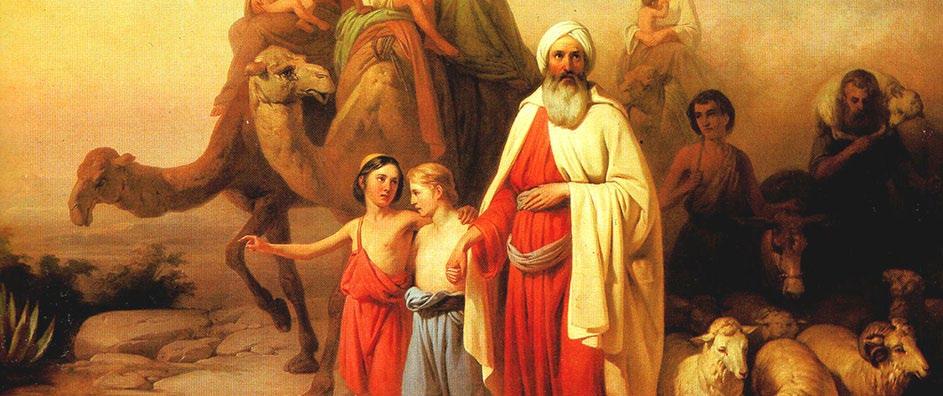
In his Laws of Star Worship 1:1, Maimonides repeats 3 times that man erred in his assumption that God “desires” man honors the stars. Maimonides says the “essence” of idolatry is equating God to a human ruler who wishes his subjects to honor his ministers. He quotes Jeremiah 10:7 who says all people recognize God, but that they erred in assuming we are to use intermediaries to gain God’s favor. The error was projecting onto God human institutions of authority. The essential “command” is not worshipping creations (Laws of Star Worship 2:1). But the “essence of idolatry”, the primary sin of idolatry, is relating to God “psychologically,” just as you relate to a human king. In this relationship, one relates to God emotionally, to satisfy his needs: “The stars will do good or bad to mankind” (Laws of Star Worship 1:2). Maimonides repeats 3 times that man’s mistake is about God’s “will.” His message is that man wrongly thought God’s will is like a king desirous of praise, distorting man’s relationship with God by throwing it into the world of psychological needs. In such a relationship, man is not searching to discover God as Abraham did, as the source of creation, the source of all wisdom. Idolatrous man lives psychologically like a child, seeking to satisfy his insecurities. He believes by honoring the stars, and then worshiping them, he will attain his needs. He does not search for God’s wisdom. But the true relationship to God was validated through Abraham: a search for
wisdom and a love for it, not a search for physical security, not a search for the “self.” Abraham was validated as correct, as God endorsed his ways and helped him learn more and teach the world:
God said to Abram, “Go forth from your native land, from your birthplace and from your father’s house to the land that I will show you. I will make of you a great nation, and I will bless you; I will make your name great, and you shall be a blessing” (Gen. 12:1,2).
God endorsed Abraham’s life of exploring God and teaching mankind. Rabbi Israel Chait said “Serving God is service of the self.” How so? Torah is for man’s good and his greatest happiness. Through Torah study and practice, one comes to appreciate Torah brilliance, drawing closer to the true Source of reality. After much study, one loses sight of himself and is no longer focused on the self, but in exploring Torah’s vast sea of amazing concepts and learning more about the Creator. Knowing Torah truths, one will not deviate from Torah with idolatry and other sins in emotional quests for personal security, as the self is no longer of significance in the face of God’s brilliance.
The real, true relationship to God, the way God desires we live, the way we are most fulfilled…is to follow our minds in exploring God’s great gift of Torah and marvel at His righteous statutes (Psalms: 119:7,62,106,164). ■

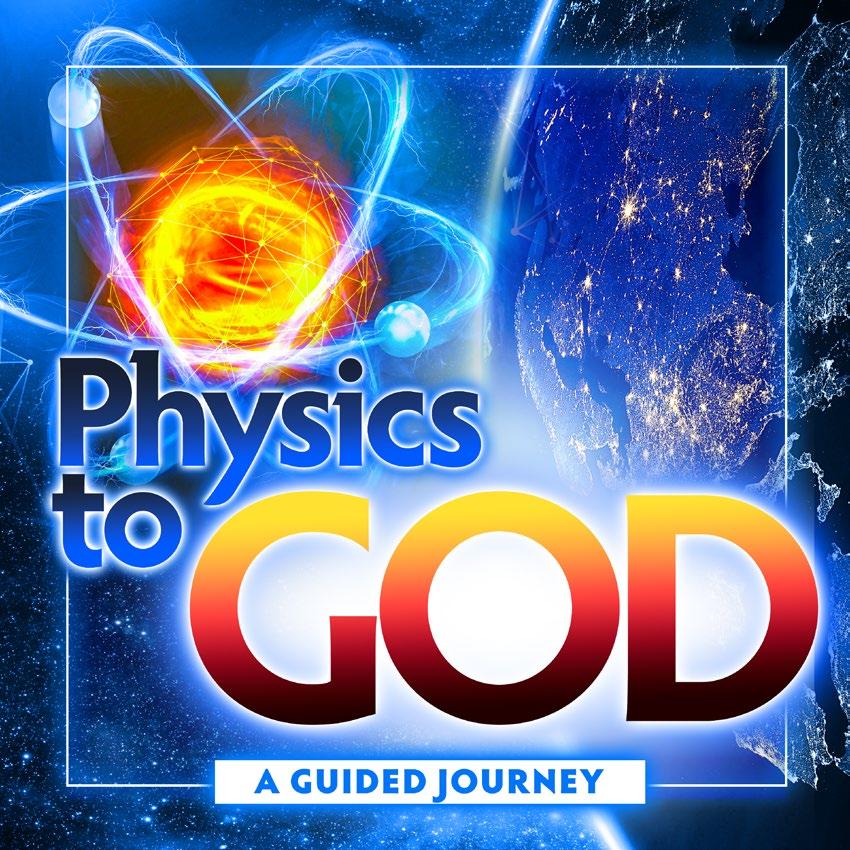
Imagine an infinite number of unobservable parallel universes, each with different laws of nature. While this idea has captured imaginations for millennia—the latest example being Marvel movies—the theory of the multiverse has recently skyrocketed in popularity, even among serious scientists. Many top physicists truly believe in an infinite multiverse and consider it the best scientific alternative for explaining the fine tuned constants of nature without an intelligent cause (or, as it is more commonly stated, without God).
Read our new paper below: https://www.physicstogod.com/is-the-multiverse-real


“Always thank God for all the good that you have (and for the bad that you don't have). Nothing is a given. Appreciate it all.” — My mother’s letter
RABBI ELIE FEDER PHD
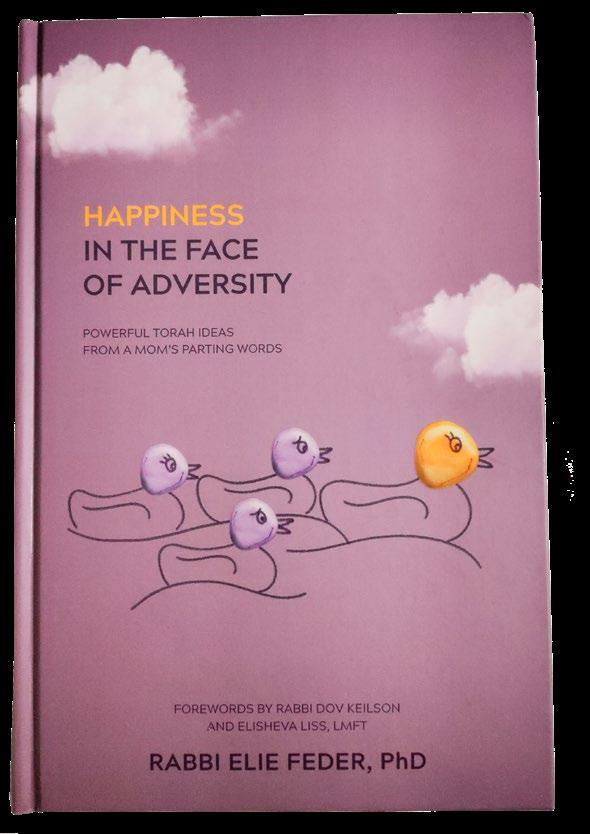

In many ways, my mother was given a challenging share in life. However, she truly exemplified the middah of being sameiach b’chelkah, happy with her share. How do I know that my mother was truly happy with her portion? For starters, it was obvious from seeing her, from interacting with her, and from experiencing her joy and optimism. She once wrote me a heartfelt letter, expressing her joy in both me and the time we spent learning Torah together. In this letter, she wrote:
“Elie, I know you worry about me – I’m sorry for causing you grief – but don’t you see – I won the lottery. Nobody has everything they want and need, but I have what I want and need the most – a family who appreciates chochmas haTorah and lives with that in mind.”
For most of us, the dream of “winning the lottery” in life wouldn’t include facing a multitude of medical challenges. However, despite her illnesses, my mother genuinely felt that she had won the lottery. This raises some profound questions: How did she maintain her joyful attitude despite her struggles? How did she rise above her pain to always smile and exude true happiness? More importantly, was her happiness merely her inborn disposition – you either have it or you don’t – or can we learn from her how we can embody this middah or, at the very least, partake of it in our own small ways? Painfully, she can’t answer any of these questions. What furthers the pain is the fact that we never asked them when she was alive. We simply didn’t realize she was leaving us so soon; we naively assumed we’d be able to ask her later. But now it’s later. And now it’s too late. To understand how my mother embodied such profound happiness in her share, let’s turn to the timeless wisdom of our Torah sages, specifically to the Mishnah in Avos.
The Mishnah in Avos 4:1 says: “Who is a rich person? One who is happy with his portion.” While we’re all familiar with this Mishnah, closer scrutiny reveals some difficulties. First, is this truly an accurate definition of wealth? Isn’t a rich person someone who possesses a lot of money? Being happy with your portion sounds more like the way that poor people would describe being rich. More seriously, why does the Mishnah define the admirable middah of being happy with one’s portion as the essence of wealth? Furthermore, how does one go about becoming happy with his portion? It doesn’t seem like the Mishnah provides any insight to help us implement this important message.
To answer these questions, we must recognize the important distinction between two frameworks of viewing the world: the relative and the absolute. Allow me to explain. A relative perspective measures things in comparison with one another. For example, children often ask questions like, “Who is smarter?” or “Who do you like better?” These questions indicate that children generally measure things by comparison with one another. A child would rather have two candies when his sibling has one, than ninety-nine candies when his sibling has a hundred. A child values what he has relative to his sibling more than he appreciates what he has in absolute terms.
While we’re no longer children, it’s not so easy to grow out of the relative perspective. For example, we naturally measure our talents, our house, and our sense of humor from a relative perspective – how good we are compared to those around us. The problem is that if we always measure ourselves relative to others, we’ll have a hard time

being happy with our own share. Even if we have a good life with everything we need, there will always be someone who has more than us—and that comparison can make us feel inadequate.
As we mature, it behooves us to step out of this relativistic perspective and embrace an absolute perspective. For example, we should love all our children in their own way – we don’t need to compare them or rank them. Similarly, we should be able to view our share from our own perspective, based upon our unique talents, abilities, strengths, and weaknesses. We don’t need to keep up with the Joneses. We can only strive to be the best version of ourselves, irrespective of where we rank relative to others.
If we can break away from a relative assessment of our share and make an absolute assessment instead, we can look at all the features of our lives that can make us happy. If so, we will usually realize that there is so much to be happy about, so much to make us rejoice in our portion. We can appreciate our house, even though it’s not as big as our neighbor’s. We can enjoy our job, even though it seems less exciting and lucrative as our best friend’s. We can appreciate what we do have without obsessing about what we don’t. If we can focus on the positive aspects of our life, we can truly be happy with our God-given share.
While shifting our focus from the relative to the absolute may help us be happier, one may question the accuracy of this perspective. After all, don’t we live in a relative world amongst other people? Isn’t our share affected by the shares of others? I think the answer is that all that ultimately matters is our objective relationship with Hashem, not where we rank in comparison to others. If you think about it, the only thing that’s truly real is our absolute state of existence before Hashem. Our relative ranking is just in our head, the result of an artificial comparison between us and the people we happen to encounter. The relative measuring rod enslaves us to our social sphere and its artificial judgments. On the other hand, the absolute measuring rod frees us to pursue what is actually good for us, allows us to be happy, and ultimately directs us to the service of Hashem.
We can now begin to appreciate why the Mishnah uses the middah of being sameiach b’chelko to define a wealthy person. Let’s first consider what makes a person rich. Is it a certain amount of money? If so, how much? Is it having more money than others? If so, which others? There will always be those who have less than you and those who have more. Are you rich because of those with less, or poor because of those with more? Given that we always fall somewhere on the spectrum of wealth, how can we ever truly call ourselves rich?
The only possible answer is that wealth isn’t based upon an arbitrary amount of money or a certain level within the relative ranking system of society; rather, it’s all about an internal attitude of being sameiach b’chelko. After all, what’s the point of being rich? Isn't it to give us an internal feeling of contentment, of having our needs taken care of? For instance, if we have massive wealth but still feel unhappy and desirous of more, can we truly say we’re rich? On the other hand, if we have very little money, but truly feel satisfied and happy with our portions, then we lack nothing; we’re truly rich. As my mother expressed, we can feel like we’ve “won the lottery.”
The Mishnah shows us that being rich is an elusive goal that can never be obtained from an endless pursuit of external acquisitions. Instead, the Mishnah defines wealth as “happiness in one’s portion” to guide us on how to become rich. It directs us towards a path centered on deep soul-searching and personal growth, a path that is focused on the absolute goodness of our portion instead of on its relative goodness in comparison with that of others.
Though I never got to ask my mother how she was so happy despite her health struggles, I am beginning to see the answer. By studying her life, her letter, and the wise words of our Sages, I think I’m getting the point. She recognized that a major impediment to happiness is the comparison
of our shares to those of others. When we sense that we have less than someone else, we feel bad about ourselves. If we can recognize that our shares truly have nothing to do with anyone else’s, we can focus on the good in our lives instead of getting distracted by the good in other people’s lives.
Though my mother faced many challenges, she also had many great parts of her life. While the challenges were difficult to deal with, she didn’t dwell on them or wonder why they happened to her and not to others. When I once asked her about her numerous illnesses, she quipped with a smile, “You know, I never got cancer.” She realized that while her share had its own unique challenges, others did as well. But her share was the one she was given, the one she gracefully accepted, and the one for which she had great appreciation.
My mother expressed this attitude so beautifully when she said, “Always thank God for all the good that you have (and for the bad that you don't have). Nothing is a given. Appreciate it all.” Her point was that in each of our lives, we experience a lot of good and are spared from a lot of bad. By letting go of unjustified expectations and embracing the truth that “nothing is a given,” we, too, can “appreciate it all” and rejoice in our God-given portion—just as she did.
Here are some thoughts that can help you incorporate the lessons gleaned from my mother’s letter and the Torah’s eternal messages into your own life.
• A major impediment to happiness: Comparing your share to that of others.
• Why this causes unhappiness: There will always be people who have good things that you don’t, or who don’t have bad things that you do. Comparing yourself to them can distract you from the good in your own life and cause you great distress.
• How this can be avoided: Train yourself to view your share in absolute terms, rather than comparing it to others’ in a relative sense.
Practical steps toward not comparing your share with others:
• Remind yourself that comparing yourself to others is purely in your own head. If you have something good or bad in your life, it doesn’t actually affect you if others have more or less. In truth, your portion has nothing to do with those of others.
• Use these thoughts to slowly train yourself to stop looking at your portion relative to others, but instead focus on your God-given portion in absolute terms.
• With a focus on your own share, consider the words of my mother: “Always thank God for all the good that you have (and for the bad that you don’t have). Nothing is a given. Appreciate it all.”
Why this helps you be happy: There is much to be happy about in your life if only you stop comparing yourself to others.
My mother’s life demonstrated that true happiness comes from a mindset deeply rooted in Torah values and principles. For a deeper analysis of Torah sources on happiness, or to explore more lessons from my mother about living a joyous Torah life, you can find Happiness in the Face of Adversity on Amazon at https://amzn.to/4i8PkLg and at Mosaica Press, or at your local seforim store.
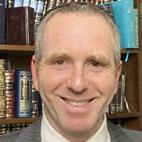
Bio: Rabbi Elie Feder PhD, a Rebbe at Yeshiva Bnei Torah and a math professor at Kingsborough Community College, is the author of Gematria Refigured (2022) and Happiness in the Face of Adversity (2024). He is also a cohost of the podcast “Physics to God” and the host of the podcast “Simply Deep.”


All books depict history, facts, theories, fiction or poetry. No book is coded with hidden messages beyond the words or patterns revealing marvels. But the Bible (Torah) was written by God, and is “coded.” The order of verses, use of certain phrases, apparent contradictions and other Biblical patterns are pur poseful clues to God’s wisdom.
This book unveils those patterns and shares the hidden messages.






MORE THAN MOST LAWS, KOSHER IS ICONIC OF JEWISH OBSERVANCE, AND NOT WITHOUT CAUSE. MANY TIMES IN HIS TORAH[1], GOD COMMANDS US TO ABSTAIN FROM EATING AND TOUCHING CERTAIN CREATURES. LIKE ALL OTHER COMMANDS, THE BENEFIT IN FOLLOWING ANY LAW LIES IN UNDERSTANDING HOW IT PERFECTS US. AND AS ALWAYS, GOD PROVIDES CLUES. THE FOLLOWING ARE GOD’S WORDS AS HE CONCLUDES THE SECTION ON PERMITTED AND PROHIBITED SPECIES:



Do not defile your souls with any loathsome thing that creeps, and do not become contaminated with them and remain contaminated through them. For I am God your God and you shall be sanctified and remain sanctified, for I am sanctified, and do not contaminate your souls with any creeping thing that crawls on the Earth. For I am God who took you out of the land of Egypt in order to be your God, and be sanctified for I am sanctified (Lev. 11:43-45).
God’s objective for us in our abstention from these creatures is to become like Him: “sanctified.” The avoidance of loathsome behavior is a path towards sanctity. But how does this sanctification work? What is “sanctity?” How does eating prohibited animals harm us? More precisely, how does eating physical objects harm our metaphysical souls? Rashi says[2] abstaining from loathsome creatures alone sufficed for God to take us out of Egypt. What is Rashi’s point? Why are we also told many times (Lev. chap 11) to additionally “abhor” (shakeitz) those creatures prohibited from our diet? But why isn’t abstention from eating sufficient? Oddly, Moses omits this abhorrence when
he repeats the section of kosher and non-kosher animals in Deuteronomy 14:3-21. Why this omission? We can eat literally all vegetation without restriction. But when it comes to animals, certain species are not to be eaten. Why this distinction? And what is significant about “creeping” things that renders it a dominant consideration among prohibited creatures? Finally, what is it about the act of eating per se that is harmful? Other peoples do not follow kosher laws, yet, they have existed as long as we have. Eating non-kosher apparently does not wipe out civilizations.
In Leviticus chapter 11, God offers us signs that indicate permitted and prohibited animals: fully-split hooves, chewing cud, fins, scales, knees (locusts), multiple legs, belly-crawlers, paws, and things that creep upon the ground. Even the Rabbis say[3] that although in the Torah birds are not signaled by a sign but by species, there is yet a sign relating to their legs. Notably, most signs indicating a species’ kosher and non-kosher status are based on its means of locomotion…an idea worth pondering.
What is significant about locomotion? Unlike inanimate vegetation, animate life—beings with locomotion—engenders human identification. We don’t identify with inanimate objects, like plants, rocks, mountains, or oceans. But animals move. This element of animate life awakens in man our identification with that creature. We are drawn to animals and visit zoos. We obtain pets and mourn at their deaths. We develop systems of animal rights, in which, man draws distinctions: killing insects or even reptiles and birds is not met with the same crime as killing dogs or cats. This is because man places greater value on those species with which he identifies greater.
Identification exists with moving creatures, unlike inanimate objects. Signs of prohibited species inhere in their means of locomotion, the feature wherein man identifies.
God wishes man to not identify with the prohibited species. By eating snakes, rats, spiders, etc. man breaks the natural barrier of disgust, and dulls his sense of what is to be loathsome. However, God wishes man to preserve this disgust. This
is why He created man with this emotion. By preserving our emotion of disgust, our behavior in all areas benefits by these “barriers.” In contrast, people who eat whatever they wish and engage in unbridled lusts, and worse—eat disgusting species—forfeit their purpose as an intelligent being. They are no longer “sanctified.” Sanctified refers to man operating on the highest level humanly possible. This level is when he is most engaged in intellectual pursuits, studying the universe and Torah, as God designed humans to do. Caving to desires without limit, and breaking the barriers of naturally-reviled things, man loses a critical boundary. (As vegetation offers man no dangers of identification, no restrictions apply. All fruits and vegetation are permitted as they were since Adam the First.)
We now understand that God wishes man to retain certain barriers. The emotion of disgust is dulled by eating/identifying with certain creatures. Rabbi Israel Chait stated that things that creep on the ground remind us of death. Perhaps it is that close proximity to the underground—the grave—that we find abhorrent in these species. This can also explain why God created man upright, unlike most other creatures…distancing us further from the Earth. “Also the world [God] planted in their hearts so man should not discover the matter that God has done from beginning to end” (Koheles 3:11). This verse refers to God’s design of man’s immortality fantasy (Ibid. Ibn Ezra). God does not wish us to be preoccupied with death. Anything that reminds us of the grave is disturbing. These ground-crawling species disgust us due to their association with the ground, with death. This disgust is reinforced through the additional prohibition of contact with their carcasses, possibly bearing out this idea of distancing us from death.
Eating is one of our two primary drives; sex is the other. The rabbis and leading psychologists are in agreement on this. God limits the Jew’s involvement in satisfying these core instincts so we may become accustomed to controlling our instincts. The goal is to enable our intellects to rule our instincts, and ultimately engage in pursuing wisdom, the greatest pleasure. A person who has no limits on his appetitive and sexual activity will find great difficulty in advancing, or even engaging his intellect. His pursuit to know God will never be realized. For he will incite cravings that only grow as he feeds them: “Rabbi Yochanan
said, ‘There is a small limb in man: starve it and it becomes satiated, feed it and it becomes hungry’” (Succah 52b). Rabbi Yochanan teaches that the more we satisfy the sexual drive, the greater the urge, and thus, less energy is available for fulfilling God’s Torah. This applies to all drives. Abstaining from lusts and from eating certain creature suffices to control our emotions on one level. By not eating “disgusting” creatures, we break identification with that species, and we additionally maintain the emotion of disgust, which can then be applied to other forbidden areas. God desires we maintain a minimal level of abhorrence in the area of the appetitive drive. Retaining this disgust for certain species, we don’t only control one emotion, but all of our emotions benefit. We will find avoiding detestable behaviors easier since we strengthened our overall emotion of disgust.
By our very nature, we cannot be overindulgent in one area, without our entire emotional makeup sensing this relaxation. This explains why the Jews worshipping the Gold Calf also arose to engage other instincts (Exod. 32:6). The satisfaction of one emotion—idolatry—causes other emotions to seek satisfaction. In contrast, barring instinctual expression—not eating disgusting creatures—controls other emotions.
Leviticus 11 categorizes mammals, then fish, then birds. It is interesting that pawed animals are not initially identified in the first group of mammals[4]. Also interesting is that mammals alone are the one group in which we do not find the word “disgusting” (shekketz). Instead, they are called “tammay” or impure. Perhaps this is because God wishes to teach another consideration within kosher laws. One aspect is what we answered: to sustain a barricade of disgust. Another benefit—in abstaining from pawed creatures—is that it engenders mercy. Pawed animals offer man more identification than other creatures. They are more like man: paws closely resemble human hands, our tools of creativity. We even ascribe intelligence to species that express greater tactile dexterity, like monkeys. The more an animal resembles man, the greater the identification. It’s a natural human response. The prohibition to abstain from pawed animals may serve the opposite benefit:

to retain a level of mercy towards God’s creatures. Therefore, God also prohibits animals that more closely resemble man. It is then not surprising that our pets are pawed. Our relationship to animals is then twofold: 1) abstention from disgusting creatures to maintain the necessary emotion of abhorrence, 2) to engender mercy toward beings that are not disgusting. Good and bad emotions are thereby kept in check. Therefore, as pawed mammals are not eaten due to a reason different from impurity, they are not included in the first mention of impure mammals.
God created man to naturally sense a feeling of abhorrence. We could have been designed to find all creatures equally appealing, but God deemed this harmful. He instilled in human nature many emotions, including disgust for many creatures. This disgust may be towards their outer appearance like rats and many insects. We also are designed to revile things that crawl on the ground like snakes and spiders, which recall the grave. God created us with disgust, and additionally commanded the Jew to reinforce this disgust through abstaining from eating or
touching many creatures. Disgust is the natural wall between man and his instincts. By abstaining from instinctual gratification according to Torah parameters, God intends that man raise himself to the life where his intellect is not compromised, but rather, free to engage in studying the Creator. This is how man is sanctified, and resembles his Creator. This is Rashi’s point, that the path to living an intelligent life is paved by controlling our instincts. Abstaining from certain species accomplishes this goal, and alone, warranted God’s Egyptian Exodus.
At first, we wonder at the various species; why are they all needed? What is kosher all about? Is it a health law? But we then appreciate that God permitted us to enjoy flesh in all corners of the Earth, since man is mobile. We travel. God provided food in all regions: land and sea, valleys and mountains. By analyzing the signs that indicate kosher and non-kosher species, we realize they address our rarely examined emotional makeup. But God teaches us through kosher laws that we must have one eye on our psychological health and strive toward
the perfection of our instincts. We also must recognize the species as God’s will and show them mercy, as in sending the mother before taking the young, thereby sparing her pain, and perhaps also via abstaining from eating pawed species. This reinforces the mercy we are to show people. With our emotions in check, abstaining from eating certain species and even going so far to abhor them too, we control our instincts and become in some small way like our perfectly intelligent Creator who is bereft of any human quality and emotion. We too can partake of wisdom, the pursuit that God designed that offers us the greatest satisfaction. As Jews, our mission differs from all other peoples. As teachers of God’s Torah, we must condition our instincts through restraint, allowing our intellects to be untarnished from urges that cloud our thought. In this pristine manner, we can study clearly and accurately teach God’s single system for mankind, in a manner that impresses all who observe us. God’s will that we impress the world with Torah will then be fulfilled, as the nations remark, “What a wise and understanding people is this great nation” (Deut. 4:6). (CONT.

“Do not defile your souls with any loathsome thing that creeps, and do not become contaminated with them and remain contaminated through them. For I am God your God and you shall be sanctified and remain sanctified, for I am sanctified and do not contaminate your souls with any creeping thing that crawls on the Earth. For I am God who took you out of the land of Egypt in order to be your God, and be sanctified for I am sanctified” (Lev. 11:43-45).
Parshas Shmini concludes by clearly identifying the prohibition as “Do not defile your souls with any loathsome thing that creeps” and “do not contaminate your souls with any creeping thing that crawls on the Earth.” Clearly, the prohibition against these species is not to a physical concern, but that our “souls”—our intelligences—should not become compromised through association with death, embodied in creatures that creep on the Earth’s surface close to the place of our graves. Perhaps even the signs in kosher mammals—split hooves—and the signs in kosher fish—fins and scales—cause those creatures to move in a way dissimilar than the non-kosher creeping creatures. We are left with the question of how chewing cud plays a role in this theory.
Why did Moses omit any reference to “shekketz” in Deuteronomy 14:3-21? Perhaps Torah contains 2 sections of kosher laws to address 2 distinct objectives. One objective[1] is to retain a level of disgust, as stated. But when Moses omits that term, he thereby
teaches that even without retaining disgust, a restricted diet serves another purpose: distinguishing the Jewish nation, which Moses states just before discussing kosher: “For you are a holy nation to the Lord your God, and you God selected to be a treasured nation from all peoples on the face of the Earth” (Deut. 14:2). Thus, Moses teaches the Jews that even without preserving the emotion of disgust, some level of diet contributes to the Jews’ role as a treasured nation. We are treasured, as we exhibit control over our most base instinct of appetite. Only one who masters his instincts can elevate his intellect and partake of the Chosen People’s role as Torah students and educators of mankind. ■

[1] Exod. 22:30, Lev. chap 11, Deut. 14:3-21.
[2] Lev. 11:45
[3] Tal. Chullin 59a. See the mishna.
[4] Lev. 11:1-8



Is Judaism mystical, or is it rational, based on reason and proofs?
